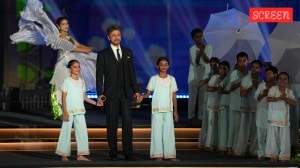Karzai ‘very angry’ over Taliban commander’s arrest
Afghan govt was holding secret talks with the Taliban's No 2 when he was captured in Pakistan,and the arrest infuriated President Hamid Karzai.
The Afghan government was holding secret talks with the Taliban’s No 2 when he was captured in Pakistan,and the arrest infuriated President Hamid Karzai,according to one of Karzai’s advisers.
The detention of Mullah Abdul Ghani Baradar — second in the Taliban only to one-eyed Mullah Mohammed Omar has raised new questions about whether the US is willing to back peace discussions with leaders who harbored the terrorists behind the September 11 attacks.
Karzai was “very angry” when he heard that the Pakistanis had picked up Baradar with an assist from US intelligence,the adviser said. Besides the ongoing talks,he said Baradar had “given a green light” to participating in a three-day peace jirga that Karzai is hosting next month.
Other Afghan officials,including Abdul Ali Shamsi,security adviser to the governor of Helmand province,also confirmed talks between Baradar and the Afghan government. Several media reports have suggested that Baradar had been in touch with Karzai representatives,but these are the first details to emerge from the discussions.
Talking with the Taliban is gaining traction in Afghanistan as thousands of US and NATO reinforcements are streaming in to reverse the insurgents’ momentum.
Reconciliation was one topic Karzai and President Barack Obama discussed during a more than one-hour video conference last night,Karzai’s office said.
Baradar’s arrest has already prompted Pakistan and others to stake out their positions on possible reconciliation negotiations that could mean an endgame to the eight-year war.
Officials have disclosed little about how Baradar was nabbed last month in the port city of Karachi. The Pakistanis were said to be upset that the Americans were the source of news reports about his arrest.
The capture was part of a US-backed crackdown in which the Pakistanis also arrested several other Afghan Taliban figures along the porous border between the two countries,after years of being accused by Washington of doing little to stop them.
Far from expressing gratitude,members of Karzai’s administration were quick to accuse Pakistan of picking up Baradar either to sabotage or gain control of talks with the Taliban leaders.
Whatever the reason,the delicate dance among Karzai,his neighbours and international partners put the debate over reconciliation on fast forward.
Top United Nations and British officials emphasised last week that the time to talk to the Taliban is now. The Afghan government,for its part,has plans to offer economic incentives to coax low and midlevel fighters off the battlefield. Another driving force is Obama’s goal of starting to withdraw US troops in July 2011.
The US,with nearly 950 lives lost and billions of dollars spent in the war,is moving with caution on reconciliation.
At a breakfast meeting in Islamabad last week,Karzai said he and his Western allies were at odds over who should be at the negotiating table. Karzai said the US was expressing reservations about talks with the top echelon of the Taliban while the British were “pushing for an acceleration” in the negotiation process.
“Our allies are not always talking the same language,” he said. Karzai said overtures to the Taliban stood little chance of success without the support of the US and its international partners. He says his previous attempts to negotiate with insurgents were not fruitful because “sections of the international community undermined — not backed our efforts.”
The US has said generally that it supports efforts to welcome back any militants who renounce violence,cut ties with al-Qaeda and recognise and respect the Afghan constitution,but it is keeping details of its position closely held.
During his trip to Afghanistan last week,Defence Secretary Robert Gates said it was premature to expect senior members of the Taliban to reconcile with the government. He said until the insurgents believe they can’t win the war,they won’t come to the table. Secretary of State Hillary Rodham Clinton has said she’s highly sceptical that Taliban leaders will be willing to renounce violence.
A US military official in Kabul said the top commander in Afghanistan,US Gen Stanley McChrystal,has not yet solidified his opinion on this issue.
He said the US is still debating the timing of the Afghan government’s outreach to senior leaders of three main Afghan insurgent groups — Omar; Jalaluddin Haqqani,who runs an al-Qaeda-linked organisation; and Gulbuddin Hekmatyar,the boss of the powerful Hezb-e-Islami.
The official added that the international military coalition had no problem with the Afghan government’s reaching out to anyone,at any time,but is concerned that a deal to end the violence not come at too high a price.
Karzai won’t discuss his administration’s talks with Taliban members or their representatives,but several Afghan officials confirmed that his government was in discussions with Baradar,who hails from Karzai’s Popalzai tribe of the Durrani Pashtuns in Kandahar.
“The government has been negotiating with Mullah Baradar,who took an offer to the Taliban shura,” Shamsi said,using the word for the group’s governing board.
Shamsi said he’d seen intelligence reports indicating that Omar resisted the offer and that Baradar’s rivals within the Taliban leadership were fiercely opposed to any negotiations with the Afghan government.
An intelligence official in southern Afghanistan said there were reports that Omar was angry about Baradar’s negotiations with the government and asked Pakistani intelligence officials to arrest him.
Nevertheless,Hakim Mujahed,a former Taliban ambassador to the United Nations,said many Taliban leaders are willing to talk.
Hamid Gul,a former director of the Pakistani intelligence service who has criticised the US role in Afghanistan,said the insurgents want three things from the US before talks could begin — a clearer timetable on the withdrawal of troops,to stop labeling them terrorists,and the release of all Taliban militants imprisoned in Pakistan and Afghanistan.
What actually precipitated Baradar’s arrest remains a mystery.





- 01
- 02
- 03
- 04
- 05


























